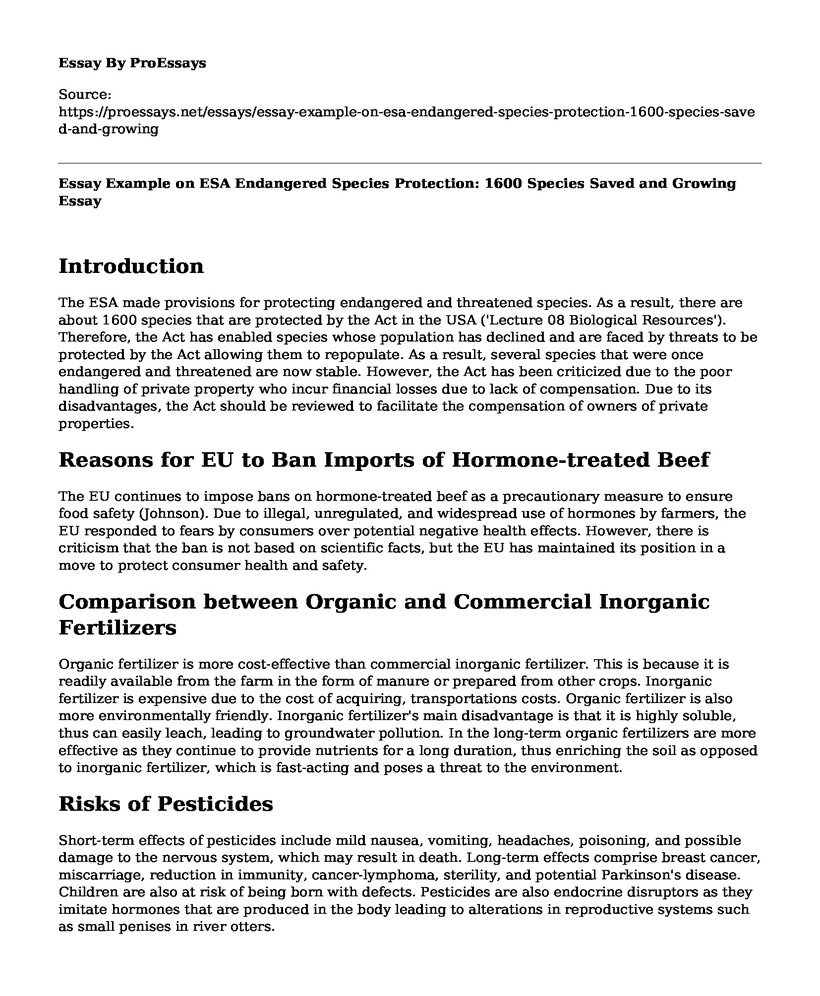Introduction
The ESA made provisions for protecting endangered and threatened species. As a result, there are about 1600 species that are protected by the Act in the USA ('Lecture 08 Biological Resources'). Therefore, the Act has enabled species whose population has declined and are faced by threats to be protected by the Act allowing them to repopulate. As a result, several species that were once endangered and threatened are now stable. However, the Act has been criticized due to the poor handling of private property who incur financial losses due to lack of compensation. Due to its disadvantages, the Act should be reviewed to facilitate the compensation of owners of private properties.
Reasons for EU to Ban Imports of Hormone-treated Beef
The EU continues to impose bans on hormone-treated beef as a precautionary measure to ensure food safety (Johnson). Due to illegal, unregulated, and widespread use of hormones by farmers, the EU responded to fears by consumers over potential negative health effects. However, there is criticism that the ban is not based on scientific facts, but the EU has maintained its position in a move to protect consumer health and safety.
Comparison between Organic and Commercial Inorganic Fertilizers
Organic fertilizer is more cost-effective than commercial inorganic fertilizer. This is because it is readily available from the farm in the form of manure or prepared from other crops. Inorganic fertilizer is expensive due to the cost of acquiring, transportations costs. Organic fertilizer is also more environmentally friendly. Inorganic fertilizer's main disadvantage is that it is highly soluble, thus can easily leach, leading to groundwater pollution. In the long-term organic fertilizers are more effective as they continue to provide nutrients for a long duration, thus enriching the soil as opposed to inorganic fertilizer, which is fast-acting and poses a threat to the environment.
Risks of Pesticides
Short-term effects of pesticides include mild nausea, vomiting, headaches, poisoning, and possible damage to the nervous system, which may result in death. Long-term effects comprise breast cancer, miscarriage, reduction in immunity, cancer-lymphoma, sterility, and potential Parkinson's disease. Children are also at risk of being born with defects. Pesticides are also endocrine disruptors as they imitate hormones that are produced in the body leading to alterations in reproductive systems such as small penises in river otters.
Legislations that Deal with Management of Hazardous Waste
The Comprehensive Environmental Response, Compensation, and Liability Act is a federal provision that facilitates clean-up abandoned hazardous waste. The Act is enforced by EPA, who take up the responsibility in case the parties responsible for the wastes are not known or to seek those responsible and to ensure they partake in the clean-up (EPA). The Resource Conservation and Recovery Act (RCRA) ensures the control of hazardous waste. The Act thus regulates the generation, transportation, treatment, and storage of hazardous waste ('Summary of the resource conservation and recovery act'). The two Acts have facilitated a reduction in hazardous waste, but it remains a menace that needs more awareness and initiatives due to the high generation.
Biological Diversity and Cultural Diversity
Biological diversity refers to the number, variety, and variability of living things. Cultural diversity refers to the availability of different cultures and lifestyles. Biological and cultural diversity are intertwined. What people eat is dependent on what the ecosystem provides. Cuisines across the world differ. The opposite is also true as the culture of people determines biological diversity. A culture whose cuisine has rice as the main meal will alternatively plant various species of rice. Therefore, both biological and cultural diversities need to be maintained to ensure the survival of organisms.
Works Cited
Johnson, Renee. 'The U.S.-EU Beef Hormone Dispute.' Congressional Research Service, 4 Jan. 2015, https://fas.org/sgp/crs/row/R40449.pdf. Accessed Apr. 14, 2020.
'Lecture 08: Biological Resources.' GUS 0842 Spring 2020.
'Summary of the Comprehensive Environmental Response, Compensation, and Liability Act (Superfund).' Environmental Protection Agency, 15 Aug. 2019, https://www.epa.gov/laws-regulations/summary-comprehensive-environmental-response-compensation-and-liability-act. Accessed Apr. 14, 2020.
'Summary of the Resource Conservation and Recovery Act.' (2019, Aug. 15). Environmental Protection Agency, 15 Aug. 2019, https://www.epa.gov/laws-regulations/summary-resource-conservation-and-recovery-act. Accessed Apr. 14, 2020.
Cite this page
Essay Example on ESA Endangered Species Protection: 1600 Species Saved and Growing. (2023, May 21). Retrieved from https://proessays.net/essays/essay-example-on-esa-endangered-species-protection-1600-species-saved-and-growing
If you are the original author of this essay and no longer wish to have it published on the ProEssays website, please click below to request its removal:
- Why Orca Whales Should Not Live in Captivity Essay
- Research Paper on Animal Breeding
- Animal Bushmeat and Ethics Essay
- Preserving Human Dignity: Human Reproductive Cloning
- Essay Example on Altering Genomes: A Practice Since Generations
- Free Report Example on Aphasia: Understanding the Neurolinguistic Disorder
- Understanding Varicose Vein Problems - Free Report Example







